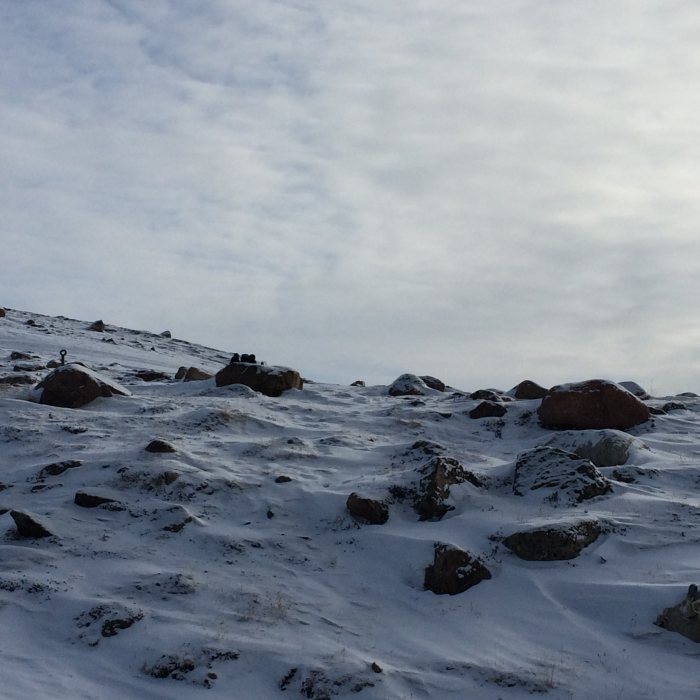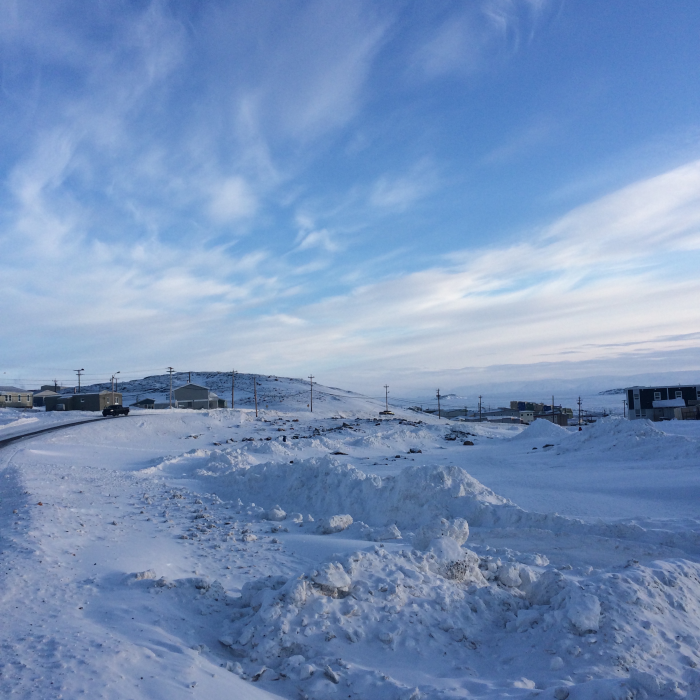Despite action in Paris, we still need to listen to Inuit peoples in climate change research to better inform decision-making in the years to come
Arctic Indigenous peoples have thrived under some of the globe’s most extreme environmental conditions. Despite the dramatic impacts of climate change on the Canadian Arctic, which is occurring at twice the global rate, Inuit peoples in Canada aim to continue living and hunting on their traditional lands at the top of the world. But without adequate access to adaptation funding, the next generations of Inuit may not be able to effectively do so. Arctic leaders at COP21 this past December in Paris stressed that the unprecedented pace of anthropogenic climate change has made adaptation much more difficult and that northern communities need assistance to adapt to climate change. However, while there is some mention of Indigenous peoples, the final agreement doesn’t appear to have any commitment to work with them.
Since Paris, US President Barack Obama and Canadian Prime Minister Justin Trudeau have announced their shared Arctic leadership strategy, committing to a sustainable Arctic development model that will feature new partnerships with Indigenous peoples. Significantly, their joint statement clearly states that the strategy will make use of both scientific evidence and Inuit traditional knowledge (ITK; also known as Inuit Qaujimajatuqangit or IQ) in balancing development decisions and in responding to the impacts of climate change. That these leaders used the platform of their meeting for this announcement was significant, not only because of its emphasis on the leadership of Indigenous peoples but also because it was a powerful acknowledgment of the importance of Inuit systems of knowledge in framing the problem of climate change.
But the power of this announcement raises some questions. Does this mean we are indeed listening to Indigenous peoples of the north when it comes to climate change? Have we built the narratives in Arctic policymaking and research to inform such a shared leadership model? While there are reasons to be optimistic about the direction of Arctic policy on climate change, dominant narratives in research and society in general have excluded Indigenous voices. Rather, they emphasize the roles of those living in southern regions in “saving” the Arctic. In light of this, policies need to look beyond much of what we think we think we already know about the north, and new narratives need to be given the space to take over if “shared leadership” is to happen in a meaningful way.

A Lack of Inuit Perspectives in Climate Change Research
One cause for concern is raised in a recent study by Murray and colleagues, which concludes that there is a dearth of studies in Arctic climate change research that address societal needs. While there is proportionally more research on the human dimensions of climate change in the Canadian (versus the US) Arctic, the study suggests that funding for social science research in Canada tends to be allocated in small amounts (less than $50,000), ignoring the realities that conducting research in the Far North is inherently expensive due to the costs of transportation.
In the broader policy arena, narratives in climate change activism have been criticized by Inuit leaders as valuing polar bears more than the people who live in the Arctic. On the other hand, more nuanced criticisms of the integration of science and ITK in research point to some subtle yet pervasive concerns. ITK is highly valued among Indigenous peoples of the north. It is a system of understanding of the natural world that is based on the authority of Inuit elders, and is rooted in Inuit spiritual worldviews. Furthermore, many Arctic scientists also value ITK for the insights it provides in understanding environmental processes and in filling knowledge gaps at the local level (Eicken and Salganek 2010; Huntington 2012). Indeed, calls have been made for years to further develop complementary ways of using both science and ITK in decision-making in the Arctic. However, some Northerners state that they have limited opportunity to influence policy and investment decisions regarding the production of science, even where it involves the complementary use of ITK and science.
“Knowing the North”
Some scholars argue that addressing today’s problems requires us to look at deeply ingrained notions of the Inuit themselves. In her book Far Off Metal River: Inuit Lands, Settler Stories, and the Making of the Contemporary Arctic, Emilie Cameron critically addresses how Southern peoples have created narratives of the Arctic and about the Inuit (2015). Early explorers act much like founding fathers in the collective Canadian psyche. While their jobs were to identify opportunities for trade in North America, their stories have shaped much of the cultural identity of the country, and particularly of the north, where few have had the opportunity to travel. In these stories, Indigenous peoples were commonly interpreted as simplistic or as savages by highly subjective and fictionalized accounts. Explorers—and later developers—were conversely seen as offering Indigenous peoples opportunities to “progress.” When Indigenous peoples have resisted such offers, they’ve been seen as naively resisting “help” and not fully understanding the ways of the world or their own needs. Over time, these stories have persisted and shaped the Inuit identity in Canadian society. They have been used to justify colonial practices claimed to be “helping” the Inuit. In response, Cameron insists that non-Indigenous peoples need to cultivate new relationships with Northerners by actively listening to them and enabling new narratives to take hold, particularly in the policy arena.

Research and the “Helping” Narrative
The “helping” mindset is firmly rooted in the modern tradition, and in public service and civil society. Cameron discusses that thus far institutions and policies have only effectively served in “helping” Inuit peoples adapt to the modern world, rather than to climate change (Cameron 2012). Her review of climate change adaptation research suggests that notions of benevolence and scientific expertise inform a “will to improve” conditions on behalf of the Inuit, rather than reflect the expressed political interests of the Inuit. The narrative, she and others (Ford et al. 2014) have observed, has focused on the vulnerabilities of individual households and largely leaves out governance, self-determination, and meaningful engagement in natural resources management decision-making (Cameron 2012; Ford et al. 2014). In this light, the collective body of research on climate change adaptation, which on the surface seems to be trying to help Arctic communities deal with the problem of climate change, may instead compound the problem by removing governance and Inuit agency from the context.
What Are Inuit Saying about Climate Change?
One Inuit perspective is documented in the autobiography The Right to Be Cold. Here, Inuit leader Sheila Watt-Cloutier depicts Inuit life as one that is imbued with both Indigenous tradition and contemporary realities (2015). Her own life story—a trajectory that went from “dog teams to mini skirts and rock ‘n’ roll” in the 1960s, to political leadership on the International Inuit Circumpolar Council (ICC) and activism on the global climate governance stage—reads as a refreshing departure from common characterizations of the north. Watt-Cloutier presents climate change as part of an ongoing historical problem—a present-day manifestation of colonialism that persistently serves to dispossess the Inuit from their traditional lands, their traditional knowledge systems, and their inherent rights as Indigenous peoples.
Watt-Cloutier’s words give some noteworthy context to today’s Arctic climate policies, which are following centuries of failed attempts to “help” Indigenous peoples. These include Canada’s now infamous Indigenous residential school system, forced relocations, the execution of sled dogs, the systematic lack of inclusion in land use decisions that has subjected northerners to exploitative interests from outside the region, and a collective body scientific research that has undermined local knowledge and the role of ITK in Inuit society. Poignantly, she states that as social problems increased as a result of these practices, programs and agencies were introduced by various levels of government to “deal” with them:
Yet these institutions seldom empowered our community, nor addressed the deep historical traumas that had created our wounds. Instead, financial support, counselling and law enforcement often took authority away from our elders and communities. It should have come as no surprise that if young people didn’t see their elders take command of their lives and their culture, they would quickly lose their own sense of responsibility and survival.
Her words convey that institutional approaches to problem solving in the Arctic have failed primarily because they circumvented local authority. In light of this, efforts toward the creation meaningful climate policymaking in the north require what has been lacking in climate research: a clear focus on governance and self-determination.
Moving Forward
If meaningful collaborations between Indigenous and non-Indigenous governments in North America are to happen, the production of knowledge about climate change and its impacts in the Arctic needs to move beyond the current technical focus. Arctic research should account for the need for new narratives of the north that move well beyond the “helping” narrative to one that features self-determination in decision-making.
It should be of notable concern that Alaskan Inuit leaders were not consulted prior to the Obama–Trudeau announcement of the Arctic strategy and that Inuit leaders in Canada have been deeply skeptical about the prospects of the Paris accord given the lack of any binding commitments to Arctic peoples. Even though scholars and policymakers account for the value of ITK, Inuit authority to make decisions for themselves with respect to climate change needs to feature in how ITK is studied and integrated into policy.
On the other hand, an optimism has been generated that attention to the Arctic at this juncture will lead to greater collaboration. With an expressed interest in working with Indigenous peoples, the months and years ahead will be critical in developing North American policy that reflects the partnerships needed to address the problem of mediating the impacts of climate change in the north.
Megan Sheremata is a PhD candidate in the Department of Physical and Environmental Sciences at the University of Toronto, Canada. She conducts research in climate change adaptation in northern Canada. Her research interests include how traditional knowledge systems and the natural sciences can be used in complementary ways to inform decision-making, and in how science is situated in the social contexts of policymaking and collaborative planning.
References
Cameron, E.S. 2012. “Securing Indigenous Politics: A Critique of the Vulnerability and Adaptation Approach to the Human Dimensions of Climate Change in the Canadian Arctic.” Global Environmental Change 22, no. 1: 103–114.
Cameron, E. 2015. Far Off Metal River: Inuit Lands, Settler Stories, and the Making of the Contemporary Arctic. Vancouver: University of British Columbia Press.
Eicken, H., and M. Salganek, eds. 2010. Field Techniques for Sea Ice Research. Fairbanks: University of Alaska Press.
Ford, J.D., G. McDowell, and J. Jones. 2014. “The State of Climate Change Adaptation in the Arctic.” Environmental Research Letters 9, no. 10.
Huntington, H.P. 2011. “Arctic Science: The Local Perspective.” Nature 478, no. 7368: 182–183.
Watt-Cloutier, S. 2015. The Right to Be Cold: One Woman’s Story of Protecting Her Culture, the Arctic and the Whole Planet. Toronto: Penguin Canada.
Cite as: Sheremata, Megan. 2016. “Can We Hear Them Now? Listening to Inuit Voices in Arctic Policy and Research.” 27 April. www.envirosociety.org/2016/04/can-we-hear-them-now-listening-to-inuit-voices-in-arctic-policy-and-research.
